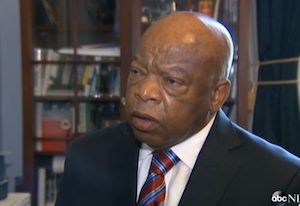Rep. Lewis: SCOTUS ‘Put a Dagger in the Heart of the Voting Rights Act’
Congressman John Lewis, the influential civil rights movement leader who witnessed the signing of the Voting Rights Act of 1965, told ABC News he was "shocked, dismayed and disappointed" after the Supreme Court's 5-4 decision Tuesday to strike down a key provision of the landmark legislation.
Rep. John Lewis, D-Ga., the influential civil rights movement leader, said he was “shocked, dismayed and disappointed” after the Supreme Court’s 5-4 decision Tuesday to strike down a key provision of the landmark Voting Rights Act of 1965. He added that it was a “very sad moment” for the country.
Led by the court’s conservative bloc, the justices struck down Section 4 of the Voting Rights Act, which stipulates what areas of the nation are required to get government or judicial preclearance to change their voting laws. The majority opinion was written by Chief Justice John Roberts.
“What the Supreme Court did was to put a dagger in the heart of the Voting Rights Act of 1965,” Lewis told ABC News during an interview after the high court issued its decision. “This act helped liberate not just a people but a nation.”
Lewis should know. At 73, he’s one of the last living civil rights leaders, and he witnessed the signing of the monumental civil rights-era legislation in 1965.
“We don’t want to go back. I’m shocked, dismayed, disappointed. I take it very personally,” Lewis said. “I gave a little blood on that bridge for the right to vote, for the right to participate in a Democratic process.”
He added, “We’ve come a distance. We’ve made progress, but there is still progress to be made.”
The longtime congressman also indicated he was concerned about the court’s instructions for Congress to update the provision. “In 2006, we had the ability and capacity to come together in bipartisan fashion to renew the Voting Rights Act of 1965,” he said, adding that he wasn’t sure today’s highly polarized Congress was capable of reaching an agreement on the important issue.
ABC News:
Lewis, who in 1986 was elected to Congress from Atlanta, still has the scars from leading a march across the Edmund Pettus Bridge on March 7, 1965, in Selma, Ala., on a day that became known as Bloody Sunday. That protest, along with many others across the South, ultimately inspired President Johnson to sign the Voting Rights Act.
Lewis still has the pen that Johnson used to sign the landmark legislation, a law he said that would pave the way for the nation to elect its first black president four decades later.
“President Barack Obama wouldn’t be the president of the United States if it hadn’t been for the Voting Rights Act of 1965, so we have made progress,” Lewis said, but he feared that a weakened Voting Rights Act would allow local election officials “to go back to another period.
Unfortunately your browser does not support IFrames.— Posted by Tracy Bloom.
Your support matters…Independent journalism is under threat and overshadowed by heavily funded mainstream media.
You can help level the playing field. Become a member.
Your tax-deductible contribution keeps us digging beneath the headlines to give you thought-provoking, investigative reporting and analysis that unearths what's really happening- without compromise.
Give today to support our courageous, independent journalists.






You need to be a supporter to comment.
There are currently no responses to this article.
Be the first to respond.